英语第一单元学案听写
八年级上册第一单元英语单词听写

八年级上册第一单元英语单词听写1. 背景介绍在八年级上册的第一单元中,学生需要掌握一定数量的英语单词,这些单词包括基本的日常用语、动词、名词、形容词等。
这些单词的掌握对学生的英语学习至关重要,因为它们是学习语法和阅读的基础。
2. 单词列表在这个单元中,学生需要掌握以下单词:1) greet2) introduce3) repeat4) spell5) surname6) age7)live8) an only child9) get up10) have breakfast11) go to school12) get home13) do homework14) go to bed3. 听写练习为了帮助学生掌握这些单词,教师可以组织听写练习。
在听写练习中,教师可以选择一些单词,在课堂上朗读出来,然后要求学生拼写出这些单词。
这样可以帮助学生加强对这些单词的记忆,并提高他们的拼写能力。
4. 听写要求在进行听写练习时,教师需要注意以下几点:- 选择合适的单词进行听写,不要选择过于复杂的单词,以免学生无法拼写正确。
- 给学生足够的时间准备,可以先在课堂上给他们复习一遍这些单词,或者在课后布置作业让他们提前准备。
- 在听写的过程中,教师需要仔细听学生的朗读,及时纠正他们的发音和拼写错误。
- 鼓励学生多加练习,可以在课后布置作业让他们继续进行单词听写练习,加强记忆。
5. 听写效果评估在听写练习结束后,教师需要对学生的听写成绩进行评估。
评估的方式可以是给予学生打分,也可以是口头表扬和建议。
通过对学生听写的评估,可以发现学生在拼写和发音上的问题,及时给予帮助和指导。
6. 听写练习的意义单词听写是英语学习中不可或缺的一部分,它对学生的英语学习有着重要的促进作用。
通过听写练习,学生可以不断地加强对单词的记忆和掌握,提高他们的拼写和发音能力,增强他们的语言表达能力。
7. 总结在八年级上册的第一单元中,英语单词听写是学生掌握单词的重要途径。
八上英语第一单元单词听写
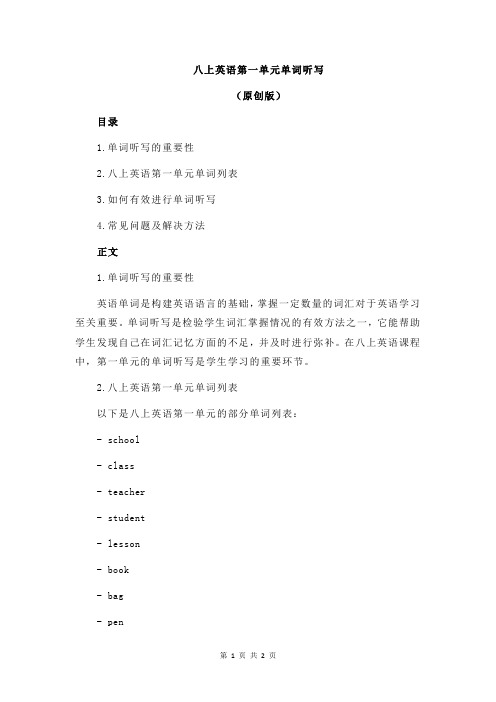
八上英语第一单元单词听写(原创版)目录1.单词听写的重要性2.八上英语第一单元单词列表3.如何有效进行单词听写4.常见问题及解决方法正文1.单词听写的重要性英语单词是构建英语语言的基础,掌握一定数量的词汇对于英语学习至关重要。
单词听写是检验学生词汇掌握情况的有效方法之一,它能帮助学生发现自己在词汇记忆方面的不足,并及时进行弥补。
在八上英语课程中,第一单元的单词听写是学生学习的重要环节。
2.八上英语第一单元单词列表以下是八上英语第一单元的部分单词列表:- school- class- teacher- student- lesson- book- bag- pen- pencil- eraser- ruler请注意,这里只列出了部分单词,具体单词列表请参考教材。
3.如何有效进行单词听写(1)制定计划:学生应根据自己的学习进度制定合理的单词听写计划,每天听写一定数量的单词,并在计划时间内完成所有单词的听写。
(2)注重发音:学生在听写单词时,应注重发音,通过自然拼读法等方法掌握单词的正确发音。
(3)结合语境:学生应将单词放入句子中进行记忆,这样可以更好地理解和记忆单词的意义。
(4)及时复习:学生要定期复习已听写的单词,巩固记忆效果。
(5)同伴互助:学生可以邀请同学一起进行单词听写,相互检查、纠正,共同提高。
4.常见问题及解决方法(1)问题:听写过程中容易出错。
解决方法:加强对单词的拼写练习,通过多次听写、默写巩固记忆。
(2)问题:听写速度慢,效率低。
解决方法:提高自己的英语听力水平,可以通过多听英语广播、观看英语电影等途径来锻炼听力。
(3)问题:发音不准确,影响听写效果。
解决方法:加强发音练习,学习并熟练运用自然拼读法。
高中英语必修一unit1单词听写

1.(使)安静下来;(使)镇静下来_________2.ad.完全地;全然地;整个地_________3.ad.在户外;在野外_________4.adj.德国的;德国人的;德语的n.德国人;德语_________5.adj.感谢的;表示谢意的_________6.adj.积满灰尘的_________7.adj.松的;松开的_________8.adj.不安的;担忧的;不适的vt.使担忧,使心烦_________9.adj.犹太人的;犹太族的_________10.adj.完全的;完全的;全部的_________11.adv.其次;其次_________12.adv.的确如此;正是;准确地_________13.n. 荷兰_________14.n.vt.不喜爱;厌恶_________15.n.窗帘;门帘;幕布_________16.n.外套;外套_________17.n.调查;测验_________18.n.马路;大路;高速马路_________19.n.孤寂;孤独_________20.n.黄昏;傍晚_________21.n.伙伴;合作者;合伙人_________22.n.连续;系列_________23.n.纳粹党人adj.纳粹党的_________24.n.实力;力气;权力_________25.n.十几岁的青少年_________26.n.手提箱;衣箱_________27.n.兽医_________28.n.提示;技巧;尖;尖端;小费vt.倾斜;翻倒_________29.n.项目;条款_________30.v. 迷住;迷惑_________31.vi.n.闲谈;闲谈_________32.vi.vt.捆扎;包装;打行李n.小包;包袱_________33.vi.vt.痊愈;复原;重新获得_________34.vi.安家;定居;停留vt.使定居;支配;解决_________35.vi.不同意_________36.vi.打雷;雷鸣n.雷;雷声_________37.vt.(使)担忧;涉及;关系到n.担忧;关注;(利害)关系_________38.vt.vi.(使)安静;(使)镇静adj.安静的;冷静的;镇静的_________39.vt.vi遭遇;忍受;经验_________40.vt.忽视;忽视_________ 41.vt.交换_________42.不得不;必需_________43.不再..._________44.不再..._________45.参与;加入_________46.对...厌烦_________47.对...厌烦_________48.有意_________49.关切;挂念_________50.合计_________51.登记;登记;放下_________52.经验;完成;检查_________53.遛狗_________54.面对面地_________55.为了_________56.相爱;爱上_________57.一系列的,一连串的;一套_________58.与...相处;进展_________59.在黄昏时刻_________60.遭遇;患病_________必修一unit 1课后单词听写。
八年级下册英语第一单元教案:掌握听说读写四项技能的平衡方法
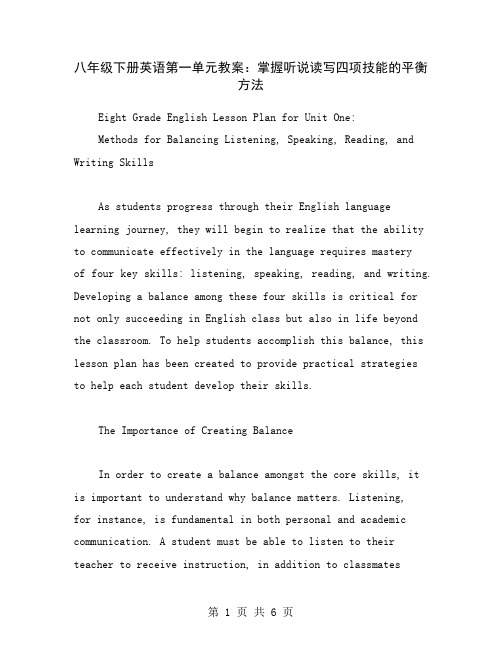
八年级下册英语第一单元教案:掌握听说读写四项技能的平衡方法Eight Grade English Lesson Plan for Unit One:Methods for Balancing Listening, Speaking, Reading, and Writing SkillsAs students progress through their English language learning journey, they will begin to realize that the ability to communicate effectively in the language requires masteryof four key skills: listening, speaking, reading, and writing. Developing a balance among these four skills is critical for not only succeeding in English class but also in life beyond the classroom. To help students accomplish this balance, this lesson plan has been created to provide practical strategiesto help each student develop their skills.The Importance of Creating BalanceIn order to create a balance amongst the core skills, itis important to understand why balance matters. Listening,for instance, is fundamental in both personal and academic communication. A student must be able to listen to their teacher to receive instruction, in addition to classmatesduring class discussion and group projects. Speaking, likewise, is vital for students to express themselves effectively. Accuracy and fluency when speaking are important assets that help students engage with others and articulate their ideas. Reading comprehension is critical because students need to be able to understand complex or nuanced information that鈥檚 presented in various forms, such as books, newspapers, or online sources. Writing is the last but not least significant skill that an English student must acquire. Good writing skills help students organize their thoughts, construct compelling arguments, and convey knowledge in writing assignments or on tests.In this lesson, we will present some practical strategies for helping each student develop their skills. In addition, each method has been designed to be flexible and adaptable, so that students can easily apply the strategies to their learning experience.Strategy 1: Active ListeningListening is an important skill, but students often underestimate the importance of listening actively. The problem is that passive listening can negatively impact theother language skills. Therefore, students must learn to engage their brains when listening, whether it is in a classroom or out. Here are some tips for actively listening:- Take notes and jot down key points that help to remember the speaker's information- Use visual cues to supplement listening- Ask clarifying questions to signal engagement with the speaker- Summarize the speaker's message to test comprehensionStrategy 2: Speaking with a PurposeEngaging with others in English is perhaps the hardest part for students, especially for those in the early stages of English language acquisition. It is important to encourage students to take risks and engage in meaningful conversations in English regularly. Here are some ways to improve speaking skills:- Practice well-constructed sentences in role-play Where the students can switch roles with their partners. For instance, the teacher provides a sentence, which student Auses in a context relevant to the topic, and student B then follows suit.- Encourage students to take advantage of practice opportunities, whether it be speaking with friends or teachers- Focus on vocabulary and intonation patterns, practice will help students improve pronunciation- Consider giving students scenarios, on which they have to work on, like trip planning, project planning, etc.Strategy 3: Building VocabularyIncreasing vocabulary is a critical element in achieving balance in the four core skills. The larger the vocabulary, the better students will be at all of the major components of language learning. Here are some ways to build student vocabulary:- Encourage students to keep a vocabulary list and update it regularly- Use flashcards or digital tools like Quizlet Pro to help memorize words- Provide opportunities for students to learn vocabulary through context, like reading or watching movies.Strategy 4: Writing with a PurposeWriting has always been considered the most challenging language skill. To improve writing skills, WIDA language standards suggest that students practice writing in different genres and at every language proficiency level. Here are some helpful tips to help students improve their writing:- Ask students about their personal interests. This not only allows using writing prompts related to their interests, but also encourages engagement and writing with enthusiasm.- Encourage students to practice various genres of writing, such as essays, stories, summaries, and descriptions, and work on crafting effective outlines and argument constructio- Provide feedback that focuses on sentence structure, transitions and critical thinkingConclusionIn sum, there is no single strategy that will create a balance among the four language skills. The key is a flexible and continuous approach, often involving trial and error.This lesson plan provides a comprehensive set of strategies to help students develop each of their four core language skills. Working in tandem, these strategies will guide students toward a more well-rounded and balanced education and life experience.。
Unit1听写汉语版讲义-高中英语人教版

记:谐音:烂摊。
2.carnival /'kɑ:nɪvl/ n.记:谐音看你玩3.dress (sb)up4.costume /'kɒstju:m/n.记:cost花费。
5. march /mɑ:tʃ/ vi.&n.记:谐音马车。
6.congratulate记:con共同一起+grat感激+ule+ate=一起感激, 共同高兴7.congratulation8.riddle记:1.rid摆脱。
2.谐音躲。
9.ceremony记:mony-money钱10.samba /'sæmbə/11.make-up12.after all13.range记:Orange 橘子14.range from ... to ...15.origin /'ɒrɪdʒɪn/记:ori,orig=rise,begin,表示"升起,开始16.religion /rɪ'lɪdʒən/ n记:1.谐音勒紧17.religious /rɪ'lɪdʒəs/18.figure/'fɪgə(r) /记:谐音肥哥。
19.charm/tʃɑ:m/记:谐音痴迷Charming adj20.joy /dʒɔɪ/ n.记:enjoy享受21.joyful22.gratitude /23.harvest /'hɑ:vɪst/记have 有你有就是一种24.agriculture记:agri田地+culture文化,25.agricultural26.crop /krɒp/记:谐音靠谱记:together28.grateful/'greɪtfl/29.f eat ure /'fi:tʃə(r)/记:eat吃。
这30.decorate31.church /tʃɜːtʃ/32. significant/sɪg'nɪfɪkənt/记:sign记号,信号+ific带有+ant→33.fade /feɪd/ vi;记:A.face 脸B.谐音废的34.fade away35.typical /'tɪpɪkl/36.firecracker /'faɪəˌkrækə(r)记:fire火37.evil /'i:vl/记:谐音恶38.in spite/spaɪt/ofmercial /kə'mɜːʃl/记:com共同+ merc交易+ ial...的→共同交易的mercialisemercialisation42.take advantage ofad vant age优点want 想要优点就是想要的东西43.medium /'mi:diəm/ (pl. media /'mi:diə/)记:mid 中间middle school中学44.the media45.reflect /rɪ'flekt/记:Re反review复习46.belief/bɪ'li:f/47.faith /feɪθ/记:fai(=fid,相信,confident自信48.occasion /əkeɪʒn/oc使+cas落下+ion→使…落下→事情发生→49.have sth in common记:common共同的com共同一起50.atmosphere /'ætməsfɪə(r)/ n记:谐音奥特曼试飞50.lunar/'lu:nə(r)/记:lun轮51.eve /i:v/ n.记:谐音一屋52.envelope /'envələʊp/记:谐音爱我老婆,53.Christmas carol /'kærəl/54.merry /'meri/记:marry结婚55.Merry Christmas!56.pumpkin /'pʌmpkɪn/记:谐音胖婆啃57.pudding /'pʊdɪŋ/记:谐音58.mashed /mæʃt/ potatoes59.roa st /rəʊst/ adj.记:谐音肉。
第一单元听写单
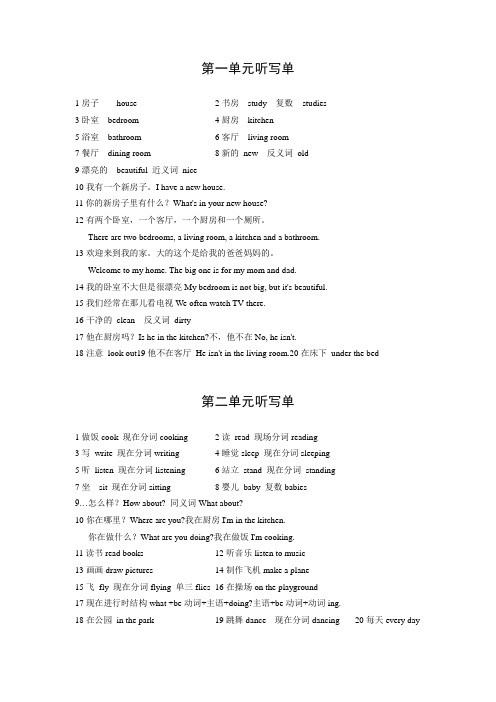
第一单元听写单1房子house 2书房study 复数studies3卧室bedroom 4厨房kitchen5浴室bathroom 6客厅living room7餐厅dining room 8新的new 反义词old9漂亮的beautiful 近义词nice10我有一个新房子。
I have a new house.11你的新房子里有什么?What's in your new house?12有两个卧室,一个客厅,一个厨房和一个厕所。
There are two bedrooms, a living room, a kitchen and a bathroom.13欢迎来到我的家。
大的这个是给我的爸爸妈妈的。
Welcome to my home. The big one is for my mom and dad.14我的卧室不大但是很漂亮My bedroom is not big, but it's beautiful.15我们经常在那儿看电视We often watch TV there.16干净的clean 反义词dirty17他在厨房吗?Is he in the kitchen?不,他不在No, he isn't.18注意look out19他不在客厅He isn't in the living room.20在床下under the bed第二单元听写单1做饭cook 现在分词cooking 2读read 现场分词reading3写write 现在分词writing 4睡觉sleep 现在分词sleeping5听listen 现在分词listening 6站立stand 现在分词standing7坐sit 现在分词sitting 8婴儿baby 复数babies9…怎么样?How about? 同义词What about?10你在哪里?Where are you?我在厨房I'm in the kitchen.你在做什么?What are you doing?我在做饭I'm cooking.11读书read books 12听音乐listen to music13画画draw pictures 14制作飞机make a plane15飞fly 现在分词flying 单三flies 16在操场on the playground17现在进行时结构what +be动词+主语+doing?主语+be动词+动词ing.18在公园in the park 19跳舞dance 现在分词dancing 20每天every day1 雪snow 现在分词snowing 形容词snowy2雨rain 现在分词raining 形容词rainy3云cloud 形容词cloudy 6雨衣raincoat7眼镜glasses 8亲爱的dear9请please 10取出take out11 穿上put on 12 they的宾格them13 看天上的云Look at the clouds in the sky.14 正在下雪吗?Is it snowing?15 有一点风There is a wind否定形式: There is no wind16 没有云There is no cloud.17 请带上雨衣please take a raincoat.18.让我们取出我们的雨衣Let's take out our raincoats.19.让我们穿上他们Let's put them on.20.来和我一起玩Come and play with me.21.多冷啊!How cold it is!22.忙碌的busy 反义词free23.贫穷的poor反义词rich24.做游戏play games第四单元听写单1.放风筝fly a kite (fly单三flies 现在分词flying)2.踢足球play football3.做运动do exercise4.看电影see a film5.洗衣服do some washing (wash的单三washes)6.爬山climb the mountain7.做他的作业do his homework8.你周六做什么?What do you do on Saturday?9.我经常踢足球I often play football.10.你爸爸周末做什么?What does your father do on the weekend?11.你的妈妈呢?How about your mother?12.他经常爬山。
五年级上册英语一单元单词听写
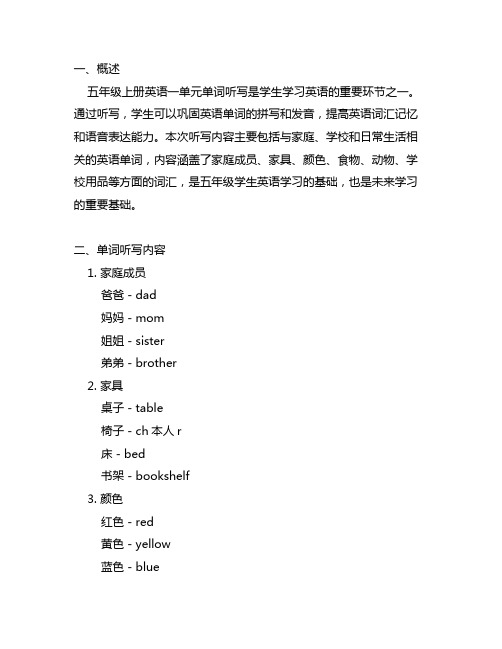
一、概述五年级上册英语一单元单词听写是学生学习英语的重要环节之一。
通过听写,学生可以巩固英语单词的拼写和发音,提高英语词汇记忆和语音表达能力。
本次听写内容主要包括与家庭、学校和日常生活相关的英语单词,内容涵盖了家庭成员、家具、颜色、食物、动物、学校用品等方面的词汇,是五年级学生英语学习的基础,也是未来学习的重要基础。
二、单词听写内容1. 家庭成员爸爸 - dad妈妈 - mom姐姐 - sister弟弟 - brother2. 家具桌子 - table椅子 - ch本人r床 - bed书架 - bookshelf3. 颜色红色 - red黄色 - yellow蓝色 - blue绿色 - green4. 食物苹果 - apple面包 - bread牛奶 - milk香蕉 - banana5. 动物狗 - dog猫 - cat兔子 - rabbit鱼 - fish6. 学校用品书 - book铅笔 - pencil尺子 - ruler书包 - schoolbag三、听写方法在进行单词听写的过程中,老师可以采用以下方法:1. 清晰准确地念出每个单词,让学生在听到单词后马上开始书写。
2. 在念出所有单词后,让学生自我检查拼写,然后再逐个核对答案。
3. 对于拼写错误的单词,老师可以给予指正,并将正确的拼写展示给学生,让他们进行听写纠错。
4. 对于一些重要的单词,老师可以适当加强练习,让学生多次听写、背诵,以加深记忆。
四、听写意义听写在学生的英语学习中有着重要的意义:1. 巩固记忆。
通过听写,学生可以加深对英语单词的印象,提高词汇记忆。
2. 提高拼写能力。
听写可以帮助学生熟悉英语单词的拼写规则,提高拼写能力。
3. 锻炼听力和口语。
通过听写,学生可以加强对英语单词的听力辨识能力,提高口语表达能力。
4. 检验学习效果。
听写可以让老师及时发现学生的学习差距,帮助他们及时调整学习方法,提高学习效果。
五、听写注意事项在进行听写时,老师需要注意以下事项:1. 要求学生在听写时认真书写,字迹工整。
小学英语第八册第一单元第一课教案:通过听、说、读、写多维度地提高英语技能
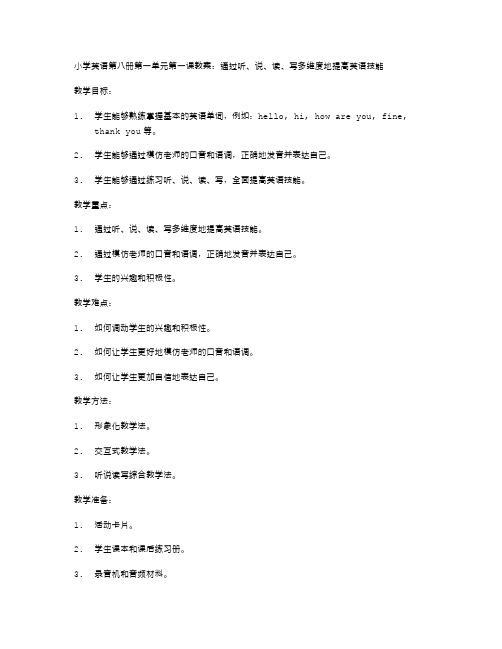
小学英语第八册第一单元第一课教案:通过听、说、读、写多维度地提高英语技能教学目标:1.学生能够熟练掌握基本的英语单词,例如:hello, hi, how are you, fine,thank you等。
2.学生能够通过模仿老师的口音和语调,正确地发音并表达自己。
3.学生能够通过练习听、说、读、写,全面提高英语技能。
教学重点:1.通过听、说、读、写多维度地提高英语技能。
2.通过模仿老师的口音和语调,正确地发音并表达自己。
3.学生的兴趣和积极性。
教学难点:1.如何调动学生的兴趣和积极性。
2.如何让学生更好地模仿老师的口音和语调。
3.如何让学生更加自信地表达自己。
教学方法:1.形象化教学法。
2.交互式教学法。
3.听说读写综合教学法。
教学准备:1.活动卡片。
2.学生课本和课后练习册。
3.录音机和音频材料。
教学过程:Step 1: Warming-up老师可以通过唱歌、跳舞等形式,调动学生的兴趣和积极性。
Step 2: Vocabulary老师通过图片、卡片等形式,让学生认识并掌握基本的英语单词,例如:hello, hi, how are you, fine, thank you等。
Step 3: Listening老师播放音频材料,让学生听一段简短的对话,然后回答问题。
Step 4: Speaking老师通过模仿口音和语调,让学生跟读对话,并在发音上做出适当的指导。
Step 5: Reading老师让学生读一遍对话,并带着正确的口音和语调读出来。
Step 6: Writing老师让学生在课本上完成相应的题目,例如:连线,填空等,以提高学生的写作能力。
Step 7: Extension老师可以根据学生的程度和兴趣,开展一些相关的活动,例如:外教讲解、英语童谣表演、角色扮演等。
Step 8: Summary老师可以让学生自由发言,总结今天所学的知识点,并强化学生的记忆。
教学反思:通过本次教学,学生们的英语表达能力和口语表达能力得到了很大的提高,并且学生们也变得更加自信和充满了学习的兴趣。
初三英语unit1单词听写(英、汉)
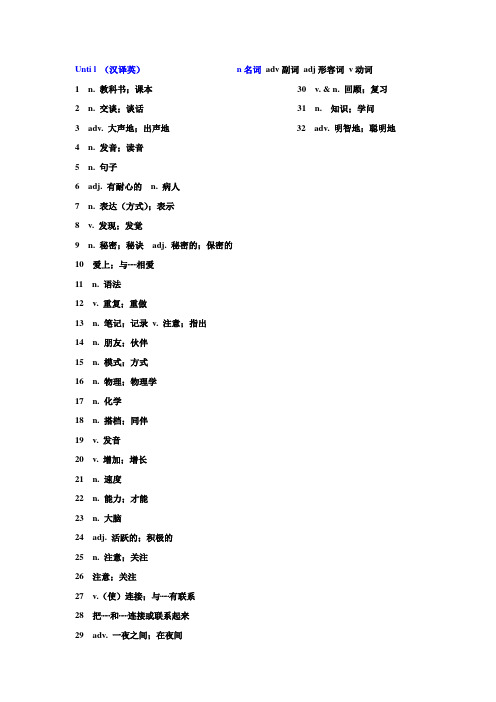
Unti l (汉译英)n名词adv副词adj形容词v动词1 n. 教科书;课本30 v. & n. 回顾;复习2 n. 交谈;谈话31 n. 知识;学问3 adv. 大声地;出声地32 adv. 明智地;聪明地4 n. 发音;读音5 n. 句子6 adj. 有耐心的n. 病人7 n. 表达(方式);表示8 v. 发现;发觉9 n. 秘密;秘诀adj. 秘密的;保密的10 爱上;与⋯⋯相爱11 n. 语法12 v. 重复;重做13 n. 笔记;记录v. 注意;指出14 n. 朋友;伙伴15 n. 模式;方式16 n. 物理;物理学17 n. 化学18 n. 搭档;同伴19 v. 发音20 v. 增加;增长21 n. 速度22 n. 能力;才能23 n. 大脑24 adj. 活跃的;积极的25 n. 注意;关注26 注意;关注27 v.(使)连接;与⋯⋯有联系28 把⋯⋯和⋯⋯连接或联系起来29 adv. 一夜之间;在夜间Unti l (英译汉)textbook n. review v. & n. conversation n. knowledge n. aloud adv. wisely adv. pronunciation n.sentence n.patient adj.expression n.discover v.secret n. adj.fall in love withgrammar n.repeat v.note n. v.pal n.pattern n.physics n.chemistry n.partner n.pronounce v.increase v.speed n.ability n.brain n.active adj.attention n.pay attention toconnect v.connect … withovernight adv.。
五年级上册英语听写u1
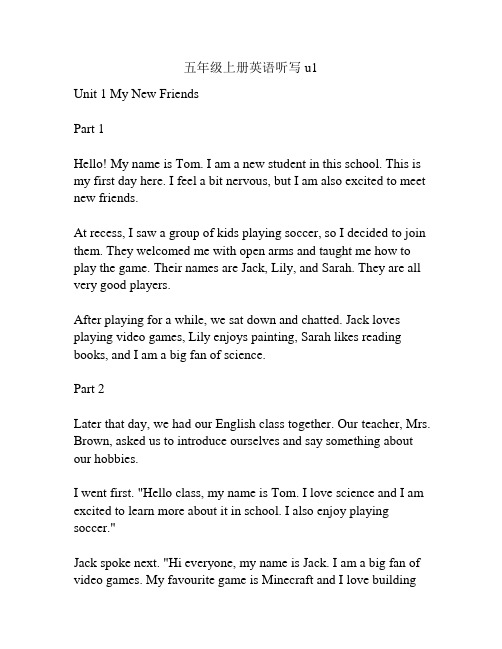
五年级上册英语听写u1Unit 1 My New FriendsPart 1Hello! My name is Tom. I am a new student in this school. This is my first day here. I feel a bit nervous, but I am also excited to meet new friends.At recess, I saw a group of kids playing soccer, so I decided to join them. They welcomed me with open arms and taught me how to play the game. Their names are Jack, Lily, and Sarah. They are all very good players.After playing for a while, we sat down and chatted. Jack loves playing video games, Lily enjoys painting, Sarah likes reading books, and I am a big fan of science.Part 2Later that day, we had our English class together. Our teacher, Mrs. Brown, asked us to introduce ourselves and say something about our hobbies.I went first. "Hello class, my name is Tom. I love science and I am excited to learn more about it in school. I also enjoy playing soccer."Jack spoke next. "Hi everyone, my name is Jack. I am a big fan of video games. My favourite game is Minecraft and I love buildingthings. I also like playing soccer with my new friends."Lily went next. "Hi, my name is Lily. I love painting. I enjoy using different colours and making beautiful pictures. I also like playing soccer."Finally, Sarah introduced herself. "Hello class, my name is Sarah. I love reading books. My favourite book is Harry Potter. I also like playing soccer with my friends."Part 3After class, we walked out of school together. As we walked, we talked about our plans for the upcoming weekend."I'm going to my cousin's birthday party," said Lily."And I'm going to a soccer tournament," added Sarah."I don't have any plans yet," said Jack. "What are you doing, Tom?""I'm going to the science museum on Saturday," I said."Wow, that sounds cool," said Jack."Can we come with you?" asked Lily and Sarah."Of course!" I said, feeling happy that I had made new friends on my first day of school.ConclusionMeeting new friends can be scary, but it can also be a lot of fun. By joining in and getting to know people, we can learn about their different interests and hobbies. We can also make plans and do fun things together. I'm looking forward to spending more time with Jack, Lily, and Sarah, and learning more about their hobbies and interests.。
八年级上册第一单元单词听写

八年级上册第一单元单词听写
八年级上册第一单元的单词听写对于学生来说是非常重要的,因为单词是语言学习的基础,听写可以帮助学生巩固单词的拼写和记忆。
在这个单元里,一般会包括一些关于家庭、日常生活、学校和活动等方面的词汇。
首先,关于家庭方面的单词可能包括家庭成员的称呼,比如father(父亲)、mother(母亲)、brother(兄弟)、sister(姐妹)等;家庭中的物品,比如table(桌子)、chair(椅子)、bed(床)等;以及描述家庭的形容词,比如big(大的)、small (小的)、clean(干净的)等。
其次,关于日常生活方面的单词可能包括一些常见的动词和名词,比如eat(吃)、drink(喝)、play(玩)、homework(作业)、breakfast(早餐)、lunch(午餐)等。
接着,关于学校方面的单词可能包括一些学习相关的词汇,比如book(书籍)、pen(钢笔)、pencil(铅笔)、teacher(老师)、student(学生)等。
最后,关于活动方面的单词可能包括一些描述活动的动词和名词,比如swim(游泳)、dance(跳舞)、music(音乐)、game
(游戏)等。
在进行单词听写时,老师可以选择一些常见的单词让学生听写,也可以根据教材内容选择相关的单词进行听写。
学生在准备听写时
可以通过反复朗读、写下单词、做练习题等方式来巩固单词记忆。
通过听写,学生可以提高对单词拼写和记忆的能力,有助于他们更
好地理解和运用所学的词汇。
三年级英语下册第一单元听写
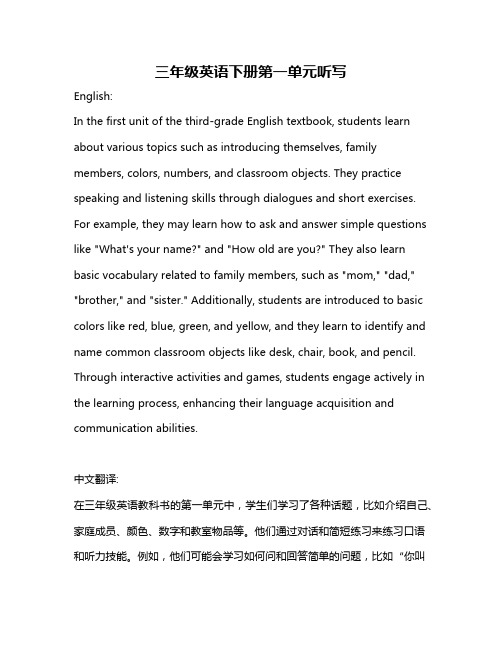
三年级英语下册第一单元听写English:In the first unit of the third-grade English textbook, students learn about various topics such as introducing themselves, family members, colors, numbers, and classroom objects. They practice speaking and listening skills through dialogues and short exercises. For example, they may learn how to ask and answer simple questions like "What's your name?" and "How old are you?" They also learn basic vocabulary related to family members, such as "mom," "dad," "brother," and "sister." Additionally, students are introduced to basic colors like red, blue, green, and yellow, and they learn to identify and name common classroom objects like desk, chair, book, and pencil. Through interactive activities and games, students engage actively in the learning process, enhancing their language acquisition and communication abilities.中文翻译:在三年级英语教科书的第一单元中,学生们学习了各种话题,比如介绍自己、家庭成员、颜色、数字和教室物品等。
Unit 1 听写单
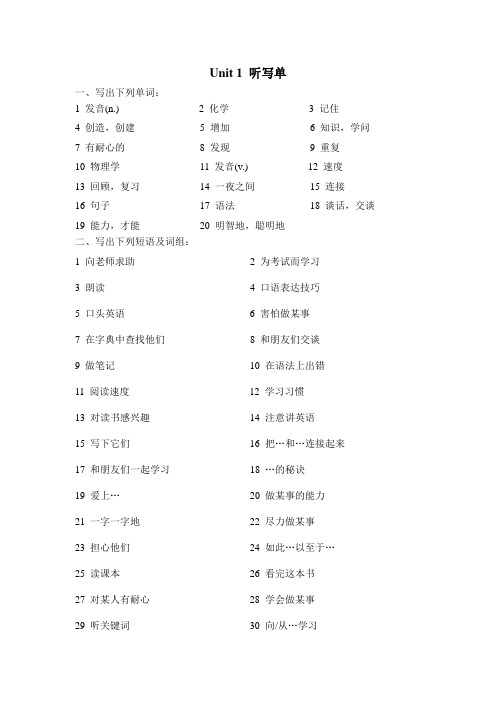
一、写出下列单词:1 发音(n.)___________2 化学____________3 记住_______________4 创造,创建________5 增加____________6 知识,学问_________7 有耐心的__________8 发现____________9 重复_______________ 10 物理学___________ 11 发音(v.)_________ 12 速度_______________ 13 回顾,复习_______ 14 一夜之间________ 15 连接_______________ 16 句子_____________ 17 语法____________ 18 谈话,交谈_________19 能力,才能_______ 20 明智地,聪明地__________________________二、写出下列短语及词组:1 向老师求助___________________2 为考试而学习____________________3 朗读_________________________4 口语表达技巧____________________5 口头英语_____________________6 害怕做某事______________________7 在字典中查找他们_____________8 和朋友们交谈____________________9 做笔记_______________________ 10 在语法上出错___________________ 11 阅读速度____________________ 12 学习习惯_____________________ 13 对读书感兴趣________________ 14 注意讲英语_____________________ 15 写下它们____________________ 16 把…和…连接起来_______________ 17 和朋友们一起学习____________ 18…的秘诀_______________________ 19 爱上…______________________ 20 做某事的能力___________________ 21 一字一字地__________________ 22 尽力做某事_____________________ 23 担心他们____________________ 24 如此…以至于…_________________ 25 读课本______________________ 26 看完这本书_____________________ 27 对某人有耐心________________ 28 学会做某事_____________________ 29 听关键词____________________ 30 向/从…学习____________________一、写出下列单词:1 陌生人_____________2 闹鬼的____________3 圣诞节______________4 传播_______________5 惩罚______________6 生意,商业__________7 甜点_______________8 传统______________9 招待,款待__________ 10 欣赏/仰慕_________ 11 偷________________ 12 女神______________ 13 磅________________ 14 亲戚/亲属_________ 15 灯笼______________ 16 鬼,鬼魂__________ 17 蜘蛛_____________ 18 现在______________19 警告,告诫________ 20 温暖_____________二、写出下列短语及词组:1 泼水节_________________________2 龙舟节_________________________3 最喜欢英语_____________________4 去上海度假_____________________5 一个…另一个…_________________6 使某人想起…___________________7 努力学习的重要性_______________8 结果,因此______________________9 飞向月亮_______________________ 10 呈…的形状____________________ 11 与…相似______________________ 12 在父亲节______________________ 13 关心我们______________________ 14 作弄某人______________________ 15 冲走,洗掉____________________ 16…的精神______________________ 17 在圣诞节前夕__________________ 18 告诫某人不做某事______________ 19 决定做某事____________________ 20 过去是一位作家________________ 21 告诉某人不做某事______________ 22 承诺做某事____________________ 23 计划做某事____________________ 24 不但…而且…__________________ 25 彼此,互相____________________ 26 摆出水果______________________ 27 拒绝做某事____________________ 28 打扮成一个鬼__________________ 29 一部鲁迅写的小说______________ 30 喜欢吃月饼____________________一、写出下列单词:1 课程___________2 地址____________3 有礼貌地______________4 迷人的_________5 正常地__________6 明信片________________7 方便的_________8 不拥挤的________9 不昂贵的______________ 10要求/请求______ 11 正确的_________ 12 不礼貌的_____________ 13 在旁边________ 14 邮票___________ 15 方向_________________ 16 角落__________ 17 地下的_________ 18 职工_________________19 附近的________ 20 中心的_________二、写出下列短语及词组:1 对某人有礼貌__________________2 在房间角落里___________________3 一些葡萄______________________4 在厕所旁边_____________________5 有礼貌地问____________________6 匆忙地_________________________7 路过;经过____________________8 沿着这条街走___________________9 在三楼________________________ 10 经过一家银行__________________ 11 以…开始_____________________ 12 在我回家的路上________________ 13 在门口_______________________ 14 忙于做某事____________________ 15 来早点儿_____________________ 16 在购物中心____________________ 17 建议做某事___________________ 18 一个吃饭的好地方______________ 19 例如_________________________ 20 在不同的情形下________________ 21 熟悉某人_____________________ 22 花费时间做某事________________ 23 引入…_______________________ 24 对不起打扰你__________________ 25 和某人交流___________________ 26 到学校的路____________________ 27 传给某人某物_________________ 28 向…介绍…____________________ 29 期待做某事___________________ 30 听起来不礼貌__________________。
2019七年级英语上册 Unit 1 My name’s Gina Section A听写本 (新版)人教新目标版
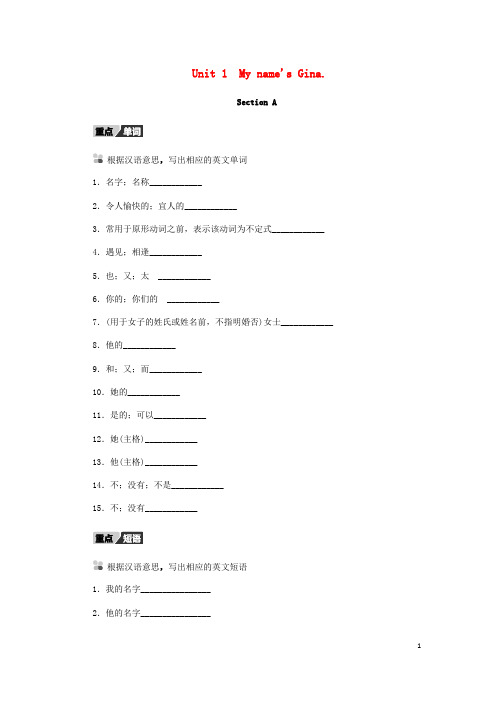
Unit 1 My name's Gina.Section A根据汉语意思,写出相应的英文单词1.名字;名称____________2.令人愉快的;宜人的____________3.常用于原形动词之前,表示该动词为不定式____________ 4.遇见;相逢____________5.也;又;太 ____________6.你的;你们的 ____________7.(用于女子的姓氏或姓名前,不指明婚否)女士____________ 8.他的____________9.和;又;而____________10.她的____________11.是的;可以____________12.她(主格)____________13.他(主格)____________14.不;没有;不是____________15.不;没有____________根据汉语意思,写出相应的英文短语1.我的名字________________2.他的名字________________3.她的名字________________4.你的名字________________根据汉语意思完成句子1.嗨。
我是吉娜。
Hi. ________ ________ is Gina./________ ________ Gina.2.她是简。
________ ________ Jane.3.“你叫什么名字?”“我叫艾伦。
”—What's ________ ________?—________ name's Alan.4.“她叫什么名字?”“她叫玛丽。
”—________ her name?—Her ________ Mary.5.“他叫什么名字?”“他叫埃里克。
”—________ ________ name?—________ ________ Eric.6.“你是海伦吗?”“是,我是。
”—________ ________ Helen?—Yes, ________ ________.7.“他是杰克吗?”“不,不是。
人教版英语六年级上册Unit 1 课堂听写课件-课件

开始对答案
•
9、要学生做的事,教职员躬亲共做;要学生学的知识,教职员躬亲共学;要学生守的规则,教职员躬亲共守。21.7.3021.7.30Friday, July 30, 2021
•
10、阅读一切好书如同和过去最杰出的人谈话。02:14:3002:14:3002:147/30/2021 2:14:30 AM
•
15、一年之计,莫如树谷;十年之计,莫如树木;终身之计,莫如树人。2021年7月上午2时14分21.7.3002:14July 30, 2021
•
16、教学的目的是培养学生自己学习,自己研究,用自己的头脑来想,用自己的眼睛看,用自己的手来做这种精神。2021年7月30日星期五2时14分30秒02:14:3030 July 2021
13、He who seize the right moment, is the right man.谁把握机遇,谁就心想事成。21.7.3021.7.3002:14:3002:14:30July 30, 2021
•
14、谁要是自己还没有发展培养和教育好,他就不能发展培养和教育别人。2021年7月30日星期五上午2时14分30秒02:14:3021.7.30
•
17、儿童是中心,教育的措施便围绕他们而组织起来。上午2时14分30秒上午2时14分02:14:3021.7.30
ቤተ መጻሕፍቲ ባይዱ
•
You have to believe in yourself. That's the secret of success. 人必须相信自己,这是成功的秘诀。
•
•
11、只有让学生不把全部时间都用在学习上,而留下许多自由支配的时间,他才能顺利地学习……(这)是教育过程的逻辑。21.7.3002:14:3002:14Jul-2130-Jul-21
- 1、下载文档前请自行甄别文档内容的完整性,平台不提供额外的编辑、内容补充、找答案等附加服务。
- 2、"仅部分预览"的文档,不可在线预览部分如存在完整性等问题,可反馈申请退款(可完整预览的文档不适用该条件!)。
- 3、如文档侵犯您的权益,请联系客服反馈,我们会尽快为您处理(人工客服工作时间:9:00-18:30)。
英语第一单元学案听写(默写)1.怎么了?(3种)
2.你/她怎么了?
3.你的电脑怎么了?
4.午饭后我们休息了一小时
5.休息(短语)
6.剩余部分,其余(短语)
7.剩余的食物坏了
8.剩余的工人来自农村
9.在我们班,一些学生在画画,其余的在阅读
10.他掉下来的时候伤到了后背
11.我的头受伤了(3种)
12.他的话深深地伤害了我
13.脱下,起飞(短语)14.穿上(短语)
15.里面热,脱下你的大衣
16.飞机五分钟后起飞
17.她感冒了,没去上班
18.我要休息一天假
19.小心。
一辆车会撞到你
20.打某人。
(两个短语)
21.打某人的头/鼻子/后背
22.打某人的脸/眼睛/嘴巴/腹部
23.他打了我的头
24.如果你不听取我的建议,你会陷入困境
25.小偷如何进入房子?
26.参与团队对于他很重要
27.习惯于。
28.我外公习惯在乡村生活
29.玛丽习惯早上早起
30.他适应在中国生活吗?适应
31.逐渐适应。
(2种)
32.逐渐适应吃这种食物是困难的
33.鲍勃喜欢冒险
34.你知道吃垃圾食品的危险吗?
35.他冒着生命危险去救那个孩子
36.发生事故
37.车祸
38.偶然,意外的
39..我们在车站偶遇了40.他昨天花完了他所有的钱(2种)
41.食物就要耗尽了
42.“享受”是什么意思?(3种)
43.是喜欢的意思
44.你这样说是什么意思?
45.打算(短语)
46.我打算明天去看我的英语老师
47.从。
出来
48.滚出我家。
49.昨天有一只老虎从动物园出来了
50.下车(2种出租和轿车)
51.决定做某事(2种一个长的一个短的)
52.他决定讲这个真理(2种)
53.他们希望你来做决定
54.他几乎不能控制自己
55.管理。
56.谁是这项目的负责人?
57.在控制之中
58.失去控制
59.别担心,一切都在控制之中
60.这些孩子管不住了
61.我们对他的死感到悲伤
62.他死在2000年
63.他死了
64.那条蛇死了吗?
65.放弃。
(两种)
66.放弃他/她们67.放弃做某事
68.她让他停止吸烟
69.我必须停止计划
70.从不停止学习。
